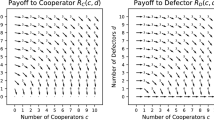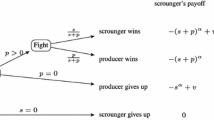Abstract
Kleptoparasitism, the stealing of food from one animal by another, is a common natural phenomenon that has been modelled mathematically in a number of ways. The handling process of food items can take some time and the value of such items can vary depending upon how much handling an item has received. Furthermore this information may be known to the handler but not the potential challenger, so there is an asymmetry between the information possessed by the two competitors. We use game-theoretic methods to investigate the consequences of this asymmetry for continuously consumed food items, depending upon various natural parameters. A variety of solutions are found, and there are complex situations where three possible solutions can occur for the same set of parameters. It is also possible to have situations which involve members of the population exhibiting different behaviours from each other. We find that the asymmetry of information often appears to favour the challenger, despite the fact that it possesses less information than the challenged individual.
Similar content being viewed by others
References
Barnard CJ, Sibly RM (1981) Producers and scroungers: a general model and its application to captive flocks of house sparrows. Anim Behav 29: 543–555
Brockmann HJ, Barnard CJ (1979) Kleptoparasitism in birds. Anim Behav 27: 487–514
Broom M, Ruxton GD (1998) Evolutionarily stable stealing: game theory applied to kleptoparasitism. Behav Ecol 9: 397–403
Broom M, Ruxton GD (2003) Evolutionarily stable kleptoparasitism: consequences of different prey types. Behav Ecol 14: 23–33
Broom M, Luther RM, Ruxton GD (2004) Resistance is useless? Extensions to the game theory of kleptoparasitism. Bull Math Biol 66: 1645–1658
Broom M, Rychtář J (2007) The evolution of a kleptoparasitic system under adaptive dynamics. J Math Biol 54: 151–177
Carbone C, Du Toit JT, Gordon IJ (1997) Feeding success of African wild dogs: does kleptoparasitism by spotted hyenas influence hunting group success. J Anim Ecol 66: 318–326
Furness RW (1987) Kleptoparasitism in seabirds. In: Croxall JP (eds) Seabirds: feeding ecology and role in marine ecosystems. Cambridge University Press, Cambridge
Gorman ML, Mills MG, Raath JP, Speakman JR (1998) High hunting costs make African wild dogs vulnerable to kleptoparasitism by hyaenas. Nature 391: 479–481
Grimm MP, Klinge M (1996) Pike and some aspects of its dependence on vegetation. In: Craig JF (eds) Pike: biology and exploitation. Chapman and Hall, London, pp 125–126
Holling CS (1959) Some characteristics of simple types of predation and parasitism. Canad Entomol 91: 385–398
Holmgren N (1985) The ideal free distribution of unequal competitors: predictions from a behaviour-based functional response. J Anim Ecol 64: 197–212
Iyengar EV (2000) To steal or not to steal? That is the question. Suspension feeding versus kleptoparasitism in a marine snail. Am Zool 40: 1073–1073
Iyengar EV (2008) Kleptoparasitic interactions throughout the animal kingdom and a re-evaluation, based on participant mobility, of the conditions promoting the evolution of kleptoparasiitism. Biol J Linn Soc 93: 745–762
Luther RM, Broom M (2004) Rapid convergence to an equilibrium state in kleptoparasitic populations. J Math Biol 48: 325–339
Luther RM, Broom M, Ruxton GD (2007) Is food worth fighting for? ESS’s in mixed populations of kleptoparasites and foragers. Bull Math Biol 69: 1121–1146
Ruxton GD, Moody AL (1997) The ideal free distribution with kleptoparasitism. J Theor Biol 186: 449–458
Shealer DA, Spendelow JA (2002) Individual foraging strategies of kleptoparasitic Roseate Terns. Waterbirds 25: 436–441
Sirot E (2000) An evolutionarily stable strategy for Aggressiveness in feeding groups. Behav Ecol 11: 351–356
Smallegange IM, Van der Meer J (2007) Interference from a game theoretical perspective: shore crabs suffer most from equal competitors. Behav Ecol 18: 215–221
Spear LB, Howell SNG, Oedekoven CS, Legay D, Bried J (1999) Kleptoparasitism by brown skuas on albatrosses and giant-petrels in the Indian Ocean. Auk 116: 545–548
Steele WK, Hockey PAR (1995) Factors influencing rate and success of intraspecific kleptoparasitism among kelp gulls. Auk 112: 847–859
Stillman RA, Goss-Custard JD, Caldow RWG (1997) Modelling interference from basic foraging behaviour. J Anim Ecol 66: 692–703
Triplet P, Stillman RA, Goss-Custard JD (1999) Prey abundance and the strength of interference in a foraging sea-bird. J Anim Ecol 68: 254–265
Tso IM, Severinghaus LL (1998) Silk stealing by Argyrodes lanyuensis (Araneae: Theridiidae): a unique form of kleptoparasitism. Anim Behav 56: 219–225
Vahl WK (2006) Interference competition among foraging waders. Ph.D. thesis (University of Groningen)
Author information
Authors and Affiliations
Corresponding author
Additional information
The research was supported by EPSRC grant EP/E043402/1 and NSF 0634182.
Rights and permissions
About this article
Cite this article
Broom, M., Rychtář, J. A game theoretical model of kleptoparasitism with incomplete information. J. Math. Biol. 59, 631–649 (2009). https://doi.org/10.1007/s00285-008-0247-2
Received:
Revised:
Published:
Issue Date:
DOI: https://doi.org/10.1007/s00285-008-0247-2




